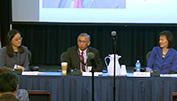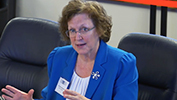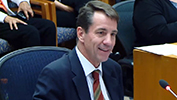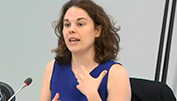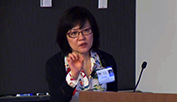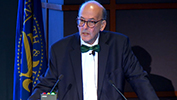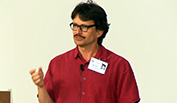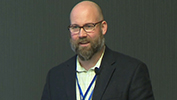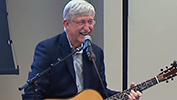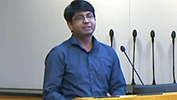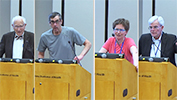-
- NIH VideoCast - Frederick National Laboratory Advisory Committee (FNLAC) - May 2018
-
- - NCI, NIH (2018/05/17)
- - Category : NCI Frederick Advisory Committee
- The 14th meeting of the Frederick National Laboratory Advisory Committee
NIH VideoCast - Frederick National Laboratory Advisory Committee (FNLAC) - May 2018
-
- NIH VideoCast - 2018 HHS Asian American and Pacific Islander Heritage Month Observance
-
- - Matthew Y.C. Lin, MD, Deputy Assistant Secretary for Minority Health, HHS and Eliseo J. P??rez-Stable, M.D., Director, NIMH, NIH (2018/05/17)
- - Category : Asian/Pacific Islander
- NIH EDI/FAPAC/APAO, HHS Parklawn FAPAC, AAPIECA, ATSDR, USPHS APAOC
Keynote Speaker: Matthew Y.C. Lin, MD, Deputy Assistant Secretary for Minority Health, U.S. Department of Health and Human Services
Plenary Speaker: Eliseo J. P??rez-Stable, M.D., Director of the National Institute on Minority Health and Health Disparities
The participants will learn through presentations and discussions on effective collaborations and partnerships which are vital to their daily work. Discussions will also address the opportunities and challenges of senior leadership development (e.g., GS-15, SES positions).
NIH VideoCast - 2018 HHS Asian American and Pacific Islander Heritage Month Observance
-
- NIH VideoCast - NLM Board of Regents Meeting - May 2018 (Day 2)
-
- - NLM, NIH (2018/05/17)
- - Category : Advisory Board Meetings and Workshops
- NLM Advisory Council Meeting
For more information go to https://www.nlm.nih.gov/od/bor/bor.html
NIH VideoCast - NLM Board of Regents Meeting - May 2018 (Day 2)
-
- NIH VideoCast - National Center for Advancing Translational Sciences Advisory Council/Cures Acceleration Network Review Board - May 2018
-
- - National Center for Advancing Translational Sciences, NIH (2018/05/17)
- - Category : NCATS Council
- The May 10, 2018, joint meeting of the NCATS Advisory Council and the Cures Acceleration Network Review Board will feature presentations from NCATS Director Christopher P. Austin, M.D., and others about the Center???s initiatives, policies, programs and future direction. For more information, visit: https://ncats.nih.gov/advisory/council and https://ncats.nih.gov/advisory/canboard
For more information go to https://ncats.nih.gov/events
NIH VideoCast - National Center for Advancing Translational Sciences Advisory Council/Cures Acceleration Network Review Board - May 2018
-
- NIH VideoCast - Task Force on Research Specific to Pregnant Women and Lactating Women (Day 1)
-
- - NICHD, NIH (2018/05/17)
- - Category : Conferences
- The Task Force is charged with providing advice and guidance to the HHS Secretary on federal activities related to identifying and addressing gaps in knowledge and research on safe and effective therapies for pregnant women and lactating women, including the development of such therapies and the collaboration on and coordination of such activities.
For more information go to https://www.nichd.nih.gov/about/meetings/2018/051418
NIH VideoCast - Task Force on Research Specific to Pregnant Women and Lactating Women (Day 1)
-
- NIH VideoCast - Gamma to the rescue: An investigation on neuroprotective effects of non-invasive sensory stimulation
-
- - Li-Huei Tsai, Ph.D., MIT (2018/05/16)
- - Category : Neuroscience
- NIH Neuroscience Series Seminar
Dr. Tsai lab???s primary goal is to elucidate the mechanisms underlying neurological disorders affecting learning & memory. The major research areas include age disorders, autism, and Alzheimer???s disease.
Dr. Tsai pursues two avenues of research that run to opposite ends of the human life span ??? from the brain as it develops in utero, to the brain as it decays in old age. Seemingly separate, they are linked by profound brain mechanisms that govern proper growth as well as proper function.
For more than a decade, in exploring possible mechanisms underlying Alzheimer???s disease, Dr. Tsai has focused on a protein kinase called Cdk5. It???s crucial to the process by which new neurons form and migrate to the outside cortical layers during development; at the same time, there???s emerging evidence that it???s key to the neuronal plasticity that allows us to remember and learn. Research in Dr. Tsai lab suggests, for example, that briefly exposing neurons to a certain protein associated with Cdk5 boosts synaptic growth and improves certain kinds of memory; extended exposure to the same protein triggers loss of neurons and severe cognitive decline.
In addition, Dr. Tsai has both accelerated the work of her own lab and advanced the field as a whole by developing an innovative mouse model that can be induced to experience the profound neurodegeneration of Alzheimer???s, and that develops full-blown symptoms in a month or two, rather than a year or more. This adaptable mouse model is ideal for Dr. Tsai???s current work ??? the search for new approaches to prevent, slow, halt and even the reverse neurodegeneration. Because the model is so easy to work with, the lab can quickly test a wide variety of possibilities, from the introduction of a specific gene, to the transplantation of the stem cells, to attempts to promote growth and integration of entirely new neurons. How soon might such research offer hope for real patients suffering the poignant, debilitating losses of rapid cognitive decline? ???I???m pretty optimistic,??? says Dr. Tsai. ???I really hope this will come to human trials in the next decade or so.???
For more information go to https://neuroscience.nih.gov/neuroseries/Home.aspx
NIH VideoCast - Gamma to the rescue: An investigation on neuroprotective effects of non-invasive sensory stimulation
-
- NIH VideoCast - Social Determinants of Health: Innovative Health Care Applications and Future Directions meeting
-
- - Office of Behavioral and Social Sciences Research (OBSSR), NIH (2018/05/15)
- - Category : Conferences
- This 1-day workshop will highlight recent innovative applications and ongoing research and facilitate dialogue between scientific researchers in the field and staff from National Institutes of Health and other Federal agencies regarding future research directions.
For more information go to https://www.scgcorp.com/SocialDeterminants18/
NIH VideoCast - Social Determinants of Health: Innovative Health Care Applications and Future Directions meeting
-
- NIH VideoCast - Precision Communications for Precision Health: Challenges and Strategies for Reaching All of Us
-
- - Eric Dishman, Director, All of Us Research Program, NIH (2018/05/15)
- - Category : Special
- Joseph Leiter NLM/MLA Lectureship 2018
The Joseph Leiter NLM/MLA Lectureship was established in 1983 to stimulate intellectual liaison between the Medical Library Association (MLA) and the National Library of Medicine (NLM. The lectureship is hosted at NLM every other year.
As director of All of Us, Eric Dishman leads the agency???s efforts to build a national research program of 1 million or more US participants to advance precision medicine. Previously, he was an Intel fellow and vice president of the Health and Life Sciences Group at Intel Corporation, where he was responsible for driving global strategy, research and development, product and platform development, and policy initiatives for health and life science solutions. His organization focused on growth opportunities for Intel in health information technology, genomics and personalized medicine, consumer wellness, and care coordination technologies.
Mr. Dishman will discuss the challenges and strategies around:
???Meeting communities where they are (understanding their needs, concerns around research, meeting their literacy levels, etc.)
???Widening the definition of precision health and conveying the fact that All of Us is more than a genomics program.
???Ethics and logistics of targeting with marketing analytics.
???Balancing the promise, with the hype and vision, with the need for patience.
Dishman is widely recognized as a global leader in health care innovation with specific expertise in home and community-based technologies and services for chronic disease management and independent living. Trained as a social scientist, he is known for pioneering innovation techniques that incorporate anthropology, ethnography, and other social science methods into the development of new technologies.
He also brings a unique personal perspective, as a cancer patient for 23 years???finally cured thanks to precision medicine???to drive a person-centric view of health care transformation.
???Eric Dishman is the perfect speaker at the perfect time,??? noted NLM Director Patricia Flatley Brennan, RN, PhD. ???His message about the power of people to advance scientific discovery is a strong one. Also, as was announced last year, NIH???s All of Us Research Program and NLM are teaming up to raise awareness about this landmark effort to advance precision medicine. As our colleagues at the Medical Library Association know so well,??? she continued, ???libraries serve as vital community hubs. NLM???s collaboration with All of Us presents a perfect opportunity to help the public understand how health research impacts all of us. By pairing our National Network of Libraries of Medicine members with public libraries to reach local communities, we hope to contribute to medical breakthroughs that may lead to more tailored disease prevention and treatment solutions for generations to come.???
NIH VideoCast - Precision Communications for Precision Health: Challenges and Strategies for Reaching All of Us
-
- NIH VideoCast - Fogarty 50th anniversary symposium, "What are the new frontiers in global health research?"
-
- - Fogarty International Center, NIH (2018/05/12)
- - Category : Conferences
- The Fogarty International Center at NIH, established in 1968, is celebrating its 50th anniversary. The Center???s 50th anniversary symposium "What are the new frontiers in global health research?" will feature a keynote address by The Lancet Editor Dr. Richard Horton; speakers from across NIH, including NIH Director Dr. Francis S. Collins, NIAID Director Dr. Anthony S. Fauci, NCI Deputy Director Dr. Douglas R. Lowy, NHLBI Director Dr. Gary Gibbons, NINDS Director Dr. Walter Koroshetz and NIA Director Dr. Richard Hodes; and Fogarty grantees and trainees from around the world discussing topics central to global health research, such as HIV/AIDS, cancer, cardiology, brain disorders and multigenerational training.
For more information go to https://www.fic.nih.gov/About/50th-anniversary/Pages/50th-anniversary-symposium-agenda.aspx
NIH VideoCast - Fogarty 50th anniversary symposium, "What are the new frontiers in global health research?"
-
- NIH VideoCast - Understanding the Journey: The Past, Present, and Future of Cardiovascular Disease in Women
-
- - Nanette Wenger, M.D., Professor of Medicine, Division of Cardiology, Emory University School of Medicine (2018/05/12)
- - Category : Special
- The NHLBI 70th Anniversary Lecture Series is designed to highlight not only significant advancements in the field of heart, lung, blood, and sleep research, but to also provide a visionary perspective of the promising opportunities ahead including addressing some of the most compelling questions and critical challenges elicited in the 2016 NHLBI Strategic Vision. The lectures include presentations from thought leaders in the medical field. All clinicians, trainees including fellows, medical students, Ph.D. students, healthcare and research professionals, and interested members of the public.
For more information go to https://www.nhlbi.nih.gov/events/2018/70th-Anniversary-Lecture-Series-3
NIH VideoCast - Understanding the Journey: The Past, Present, and Future of Cardiovascular Disease in Women
-
- NIH VideoCast - Molecular Mechanisms of Regulation of Ion Channels by Intracellular Domains
-
- - William Zagotta, Ph.D., University of Washington (2018/05/12)
- - Category : Neuroscience
- NIH Neuroscience Series Seminar
Ion channels play a fundamental role in the generation of an electrical response to light in rods and cones of the vertebrate retina. The closing of a cation selective channel in the outer segment of these photoreceptors represents the final step in the enzymatic cascade that begins with the absorption of a photon of light by rhodopsin. The photo-activated rhodopsin activates a phosphodiesterase via the GTP binding protein transducin. The phosphodiesterase catalyzes the hydrolysis of guanosine 3???,5???-cyclic monophosphate (cGMP), lowering the cytosolic concentration of cGMP and closing a cGMP-activated channel in the membrane of the outer segment. The closing of a cation selective channel causes a hyperpolarization of the photoreceptor outer segment which is transmitted to the inner segment where it modulates transmitter release. Clearly the cGMP-activated channel plays a central role in visual transduction. The cyclic nucleotide-activated channels are beautifully optimized for their role in signal transduction. The long term goal of Dr. Zagotta lab???s research is to elucidate the molecular basis for these specializations. A detailed understanding of the molecular mechanisms of these channels??? function provides insight into electrical signaling in a number of sensory and physiological processes.
Their approach to studying the opening and closing conformational changes in these channels is to use a combination of molecular biology and patch-clamp techniques. After a cDNA clone for a particular channel has been isolated, it can be expressed in Xenopus oocytes and studied using the patch-clamp technique. The single-channel patch-clamp method measures the kinetic behavior of single ion channel proteins as they undergo opening and closing conformational changes. Statistical analysis of these single-channel events provides detailed information about the number of distinct conformational states of the channel protein, the allowed conformational transitions between these states, and the relative energies of the various conformations. The channels can then be genetically altered via gene cloning and site-directed mutagenesis, and the effects on channel function examined using the patch-clamp technique. In this way they can localize the regions in the channel sequence that are responsible for its behavior.
For more information go to https://neuroscience.nih.gov/neuroseries/Home.aspx
NIH VideoCast - Molecular Mechanisms of Regulation of Ion Channels by Intracellular Domains
-
- NIH VideoCast - Harnessing the Immune System to Fight HPV-Related Tumors in the Airway
-
- - Clint Allen, M.D., Otolaryngology Surgeon-Scientist and Principal Investigator, Translational Tumor Immunology Program, NIDCD, NIH (2018/05/12)
- - Category : Special
- Beyond the Lab, Understanding Communication Disorders
Designed for administrative and support staff as well as scientists, the "Beyond the Lab, Understanding Communication Disorders" speaker series gives the NIH community an opportunity to learn about NIDCD`s research and research advances.
For more information go to https://www.nidcd.nih.gov/research/beyond-the-lab
NIH VideoCast - Harnessing the Immune System to Fight HPV-Related Tumors in the Airway
-
- NIH VideoCast - 2018 Demystifying Medicine: The National Institutes of Hope
-
- - Francis Collins, MD, PhD, Director, NIH (2018/05/12)
- - Category : Demystifying Medicine
- The Demystifying Medicine Lecture Series is designed to help bridge the gap between advances in biology and their applications to major human diseases. The lectures include presentations of patients, pathology, diagnosis, and therapy in the context of major diseases and current research. All clinicians, trainees including fellows, medical students, Ph.D. students, and other healthcare and research professionals are welcome to attend.
For more information go to https://demystifyingmedicine.od.nih.gov/
NIH VideoCast - 2018 Demystifying Medicine: The National Institutes of Hope
-
- NIH VideoCast - Biowulf Seminar Series: Cryo-EM studies of glutamate receptors and nucleosomes
-
- - Sagar Chittori, Ph.D., NCI, NIH (2018/05/12)
- - Category : Special
- Biowulf Seminar Series
Electron microscopy (EM) has been traditionally used to calculate three-dimensional reconstructions that were interpreted using high-resolution structures determined by X-ray crystallography and NMR to provide biological insights into the function of large macromolecular assemblies. However, recent technological and methodological developments in cryo-EM have now made it possible to routinely study biological macromolecules of lower molecular weight at near-atomic resolutions, thus opening up an interesting area of determining three dimensional structures of novel complexes. Here, I will discuss the following two examples to highlight the role of single particle cryo-EM in advancing the structural biology: 1. Ionotropic glutamate receptors (iGluRs) ??? here we used single particle cryo-EM in conjunction with high resolution structures determined by X-ray crystallography to reveal key conformational changes involved in receptor gating [references 1 and 2]. 2. Structure of the centromeric nucleosome in complex with the kinetochore protein CENP-N ??? to illustrate an example where we utilized the cryo-EM density map to carry out ab initio modeling of the CENP-N component without any prior knowledge of its three-dimensional structure [reference 3]. With these and ongoing advances in cryo-EM, it is now feasible to study other previously intractable biological complexes
For more information go to https://hpc.nih.gov/training
NIH VideoCast - Biowulf Seminar Series: Cryo-EM studies of glutamate receptors and nucleosomes
-
- NIH VideoCast - Is Lack of Sleep ???Bugging??? You? Unravelling the Sleep-Gut Microbiome Connection
-
- - 1) Alyssa T. Brooks, PhD Scientific Program Specialist, Nursing Research and Translational Science Section, Nursing Department, CC, NIH 2) Nancy Ames, RN, PhD, Clinical Nurse Scientist, Nursing Research and Translational Science Section, Nursing Department, CC, NIH (2018/05/12)
- - Category : Clinical Center Grand Rounds
- Is Lack of Sleep ???Bugging??? You? Unravelling the Sleep-Gut Microbiome Connection
For more information go to http://www.cc.nih.gov/about/news/grcurrent.html
NIH VideoCast - Is Lack of Sleep ???Bugging??? You? Unravelling the Sleep-Gut Microbiome Connection
-
- NIH VideoCast - Contemporary Clinical Medicine: Great Teachers: The Meaning of Biomedical Meanings: Confessions of an English Major Who Cared Deeply About Data Interoperability for Biomedical Discovery and Translational Research
-
- - Christopher G. Chute, MD, DrPH, Bloomberg Distinguished Professor of Health Informatics and Professor of Medicine, Public Health, and Nursing, Johns Hopkins University (2018/05/04)
- - Category : Clinical Center Grand Rounds
- Contemporary Clinical Medicine: Great Teachers: The Meaning of Biomedical Meanings: Confessions of an English Major Who Cared Deeply About Data Interoperability for Biomedical Discovery and Translational Research
For more information go to https://www.cc.nih.gov/about/news/grcurrent.html
NIH VideoCast - Contemporary Clinical Medicine: Great Teachers: The Meaning of Biomedical Meanings: Confessions of an English Major Who Cared Deeply About Data Interoperability for Biomedical Discovery and Translational Research
-
- NIH VideoCast - Development and Function of Dendritic Cells in the Immune Response
-
- - Ken Murphy, PhD, Eugene Opie First Centennial Professor of Pathology & Immunology, Washington University School of Medicine (2018/05/04)
- - Category : Immunology
- Immunonology IG Seminar
Dr. Ken Murphy obtained his MD and PhD from the Johns Hopkins University School of Medicine. In 1984, he began a residency in Pathology at Washington University School of Medicine in St. Louis. After this, he did postdoctoral work in molecular immunology with Dr. Dennis Loh, where he generated the DO11.10 TCR transgenic mouse used in studies of self-tolerance, and later in studies of Th1/Th2 development. In 1990, he joined the Pathology and Immunology Department at Washington University, where he is now full professor and an investigator of the Howard Hughes Medical Institute. His work has focused on important cell fate and lineage decisions during the development of the immune system and during immune responses to pathogens, particularly at the transcriptional level. His lab was the first to demonstrate that the innate immune system, through interactions with pathogens, controls the quality of the adaptive immune response, such as induction of Th1 development through macrophage- and dendritic cell-derived cytokines. Current work continues to focus on important fate decisions, such as the development of specialized subsets of dendritic cells involved in the activation of T cell responses to viral pathogens.
NIH VideoCast - Development and Function of Dendritic Cells in the Immune Response
-
- NIH VideoCast - High-throughput quantitative proteomics
-
- - Si Wu, Ph.D., Assistant Professor, University of Oklahoma (2018/05/04)
- - Category : Proteomics
- ProtIG Lecture Series
The ability to rapidly identify functional proteins with post translation modifications (PTMs) is a crucial element in understanding cellular function. Protein PTMs have emerged in the post-genomic era critical features in regulating and diversifying protein biological activity, but identifying specific proteoforms with PTMs and understanding their function on individual proteins is currently limited by the lack of effective and accessible analytical methods. Therefore, there is a crucial need to develop a high-throughput approach to functionally characterize intact proteins and their modified proteoforms at the systems level. The overall purpose of our research program is to develop and apply new top-down and functional mass spectrometry (MS) proteomics technologies to characterize intact proteins and their modified proteoforms. This talk includes our recently developed high-throughput quantitative top-down MS platform that couples an online 2D pH RP/RPLC separation and multiplexed TMT top-down quantitation to identify and quantify low abundance intact proteins and their modified proteoforms in complex biological samples. I will also discuss our results on detecting intact autoantibody biomarkers in systemic lupus erythematosus (SLE) patient serum samples.
NIH VideoCast - High-throughput quantitative proteomics
-
- NIH VideoCast - Kuan-Teh Jeang Memorial Lecture: Functional Map of Viral Genomes at Single Nucleotide Resolution
-
- - Ren Sun, Ph.D., Associate Vice Provost, University of California, Los Angeles (2018/05/03)
- - Category : Asian/Pacific Islander
- Kuan-Teh Jeang Memorial Lecture
NIH Office of Equity Diversity and Inclusion & NIH Office of Intramural Research
NIH VideoCast - Kuan-Teh Jeang Memorial Lecture: Functional Map of Viral Genomes at Single Nucleotide Resolution
-
- NIH VideoCast - 2018 Demystifying Medicine - Bridge-Building Careers for PhD and MD Fellows
-
- - Win Arias, M.D., Scientist Emeritus, NIH and Creator of the Demystifying Medicine course, Jonathan Yewdell, M.D., Ph.D., Senior Investigator, Cellular Biology and Viral Immunology, NIAID, NIH, Sharon Milgram, PhD, Director, OITE, NIH and Michael Gottesman, M.D., Deputy Director, Intramural Research, NIH (2018/05/03)
- - Category : Demystifying Medicine
- PhD- and MD-level fellows are encouraged to see the next Demystifying Medicine lecture for a discussion about (gulp!) the future. Know your career options; there may be paths that you don`t realize.
This penultimate lecture in this year`s Demystifying Medicine series, titled "Bridge-Building Careers for PhD and MD Fellows," will feature Michael Gottesman, M.D., the Deputy Director for Intramural Research; Jonathan Yewdell, M.D., Ph.D., a senior investigator in NIAID`s Cellular Biology and Viral Immunology Section; and Win Arias, M.D., scientist emeritus and creator of the Demystifying Medicine course.
The Demystifying Medicine Lecture Series is designed to help bridge the gap between advances in biology and their applications to major human diseases. The lectures include presentations of patients, pathology, diagnosis, and therapy in the context of major diseases and current research. All clinicians, trainees including fellows, medical students, Ph.D. students, and other healthcare and research professionals are welcome to attend.
For more information go to https://demystifyingmedicine.od.nih.gov
NIH VideoCast - 2018 Demystifying Medicine - Bridge-Building Careers for PhD and MD Fellows




